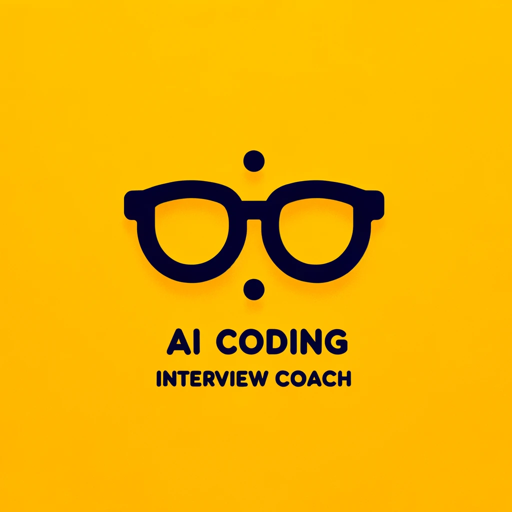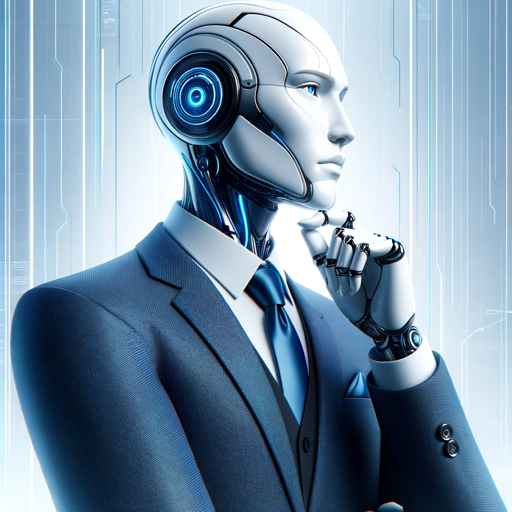Software Engineer Behavioral Interview-AI-powered interview prep tool.
AI-powered Insights for Behavioral Interviews
Describe a challenging project you handled.
How did you resolve a critical bug in your team?
Tell me about learning a new technology for a project.
Share your experience with tight deadlines at your company.
Related Tools
Load More
Software Engineer
Expert Software Engineer in Java, AWS, JavaScript, Python, React. Offers quality code and problem-solving strategies.

Coding Interview Coach
AI Coding Interview Coach: algorithms & data structures, system design & machine learning expert. Prepare for FAANG SDE & AI Engineering interviews with LeetCode, HackerRank & Grokking style technical interviews. Ace Google, Meta (Facebook), Amazon, Appl

模拟面试 - 技术面
解析简历信息、设计技术问题、模拟实际面试场景。展现您的充足准备,AI面试官助您斩获理想工作!

FAANG.AI
Get into FAANG. Practice with an AI expert in algorithms, data structures, and system design. Do a mock interview and improve.

Behavior Question Interview Coach
Guides on interviews focusing on behavior questions.

Software Engineer Resume Coach
I provide critical resume advice for software engineers, with examples if needed.
20.0 / 5 (200 votes)
Introduction to Software Engineer Behavioral Interview
The Software Engineer Behavioral Interview is designed to evaluate candidates' interpersonal and problem-solving skills, which are critical in a software development environment. This type of interview goes beyond technical skills to assess how individuals handle real-world situations, interact with team members, and contribute to projects. It often involves asking candidates to describe past experiences using the STAR (Situation, Task, Action, Result) method to provide clear and structured responses. For example, a candidate might be asked to describe a situation where they had to resolve a conflict within a team, how they approached it, and what the outcome was.

Main Functions of Software Engineer Behavioral Interview
Assess Communication Skills
Example
Candidates are asked to describe a time when they had to communicate complex technical information to a non-technical audience.
Scenario
During a project meeting, a software engineer needed to explain the implications of a technical issue to a group of stakeholders with varying technical backgrounds. By effectively using analogies and simple language, the engineer ensured everyone understood the problem, leading to a collaborative decision-making process.
Evaluate Teamwork and Collaboration
Example
Interviewers ask candidates to recount a situation where they had to work closely with others to achieve a common goal.
Scenario
In a cross-functional team project, a software engineer collaborated with UX designers and product managers to redesign a feature. The engineer facilitated open communication and incorporated feedback, resulting in a user-friendly and technically sound solution.
Analyze Problem-Solving Abilities
Example
Candidates are prompted to discuss a challenging technical problem they encountered and how they resolved it.
Scenario
While developing a new application feature, a software engineer faced a critical bug that delayed progress. By systematically isolating variables and leveraging debugging tools, the engineer identified the root cause and implemented a fix, thereby meeting the project deadline.
Ideal Users of Software Engineer Behavioral Interview Services
Job Seekers in Software Engineering
Individuals preparing for software engineering interviews benefit from practicing behavioral questions. These candidates often aim to improve their ability to articulate experiences and demonstrate their soft skills, which are essential for success in interviews.
Recruiters and Hiring Managers
Recruiters and hiring managers use behavioral interviews to gain deeper insights into a candidate’s suitability for a team. By focusing on past behaviors, they can better predict future performance and ensure the candidate aligns with the company culture and team dynamics.

Guidelines for Using Software Engineer Behavioral Interview
1
Visit aichatonline.org for a free trial without login, also no need for ChatGPT Plus.
2
Familiarize yourself with the STAR method (Situation, Task, Action, Result) to effectively interact with the tool and gain the most from responses.
3
Prepare a list of common behavioral questions or scenarios you expect to encounter in a software engineering interview, focusing on teamwork, problem-solving, and project management.
4
Engage with the tool by providing detailed context for your queries. The more specific the scenario, the more tailored the response will be.
5
Review and refine the generated responses. Use the insights to practice and enhance your interview skills, focusing on clarity and depth.
Try other advanced and practical GPTs
Tech Recruiter
AI-driven insights for tech recruitment.

de imagen a texto
AI-Powered Text Extraction Tool

Guion videos cortos
AI-powered TikTok Script Creator

UPSC Prelims Analyser
AI-powered question analysis for UPSC success

Fitness Chef Recipes - (Average Cost Included)
Smart recipes, healthier meals, better costs.

Epub translator
AI-powered Epub translation made simple

언론홍보 보도자료 작성 봇
Automate your press release writing with AI.

护理科研Focus科研顾问
AI-Powered Nursing Research Simplified

Industrial Design
AI-powered industrial design insights.

Asesor Legal de Argentina
AI-Powered Legal Assistance for Argentina

Anime Gal
AI-powered anime character creation

Brief Buddy
Instant, precise answers with AI.

- Interview Prep
- Skill Assessment
- Mock Interviews
- Career Coaching
- Behavioral Questions
Q&A About Software Engineer Behavioral Interview
What is the main purpose of the Software Engineer Behavioral Interview tool?
The tool is designed to help individuals prepare for software engineering behavioral interviews by providing structured responses based on the STAR method. It focuses on delivering insights into scenarios commonly faced in the software industry, such as teamwork, problem-solving, and project management.
How does the tool tailor responses to specific queries?
The tool utilizes detailed prompts to generate responses that reflect realistic situations and challenges in the software engineering field. It takes into account the context provided by the user to craft answers that are relevant and comprehensive, offering both technical and soft skill perspectives.
Can this tool be used for preparing interviews beyond software engineering?
While the primary focus is on software engineering, the principles of behavioral interviews, such as the STAR method, are applicable across various industries. Users can adapt the tool’s outputs for broader use by focusing on general behavioral competencies.
What are some best practices for using the tool effectively?
To maximize the tool's benefits, users should provide clear and detailed scenarios, use the STAR method for structuring responses, and actively reflect on the feedback provided. It's also recommended to rehearse the responses and adapt them to personal experiences.
Is the tool suitable for all experience levels?
Yes, the tool is designed to cater to all experience levels, from entry-level candidates to seasoned professionals. It provides nuanced insights that can help both novices understand the interview process and experienced engineers refine their storytelling skills.